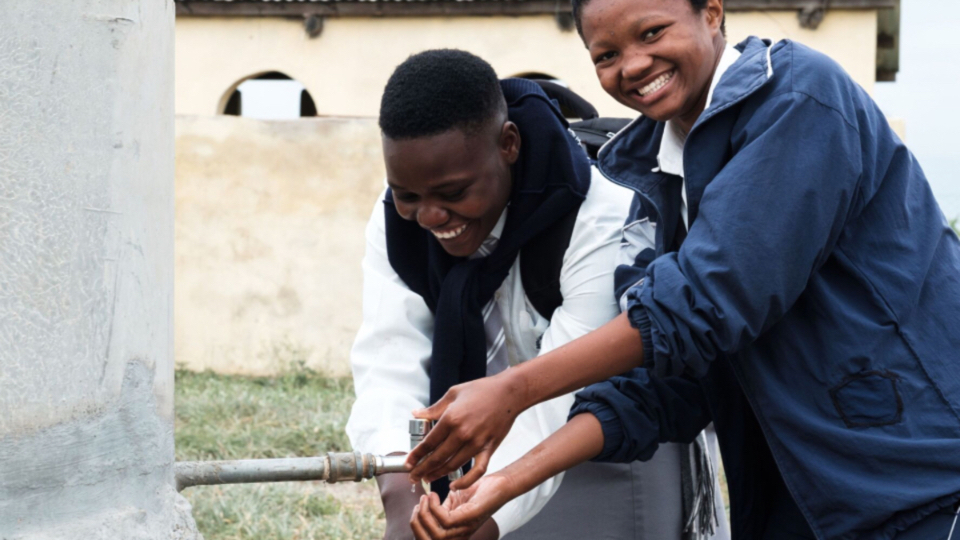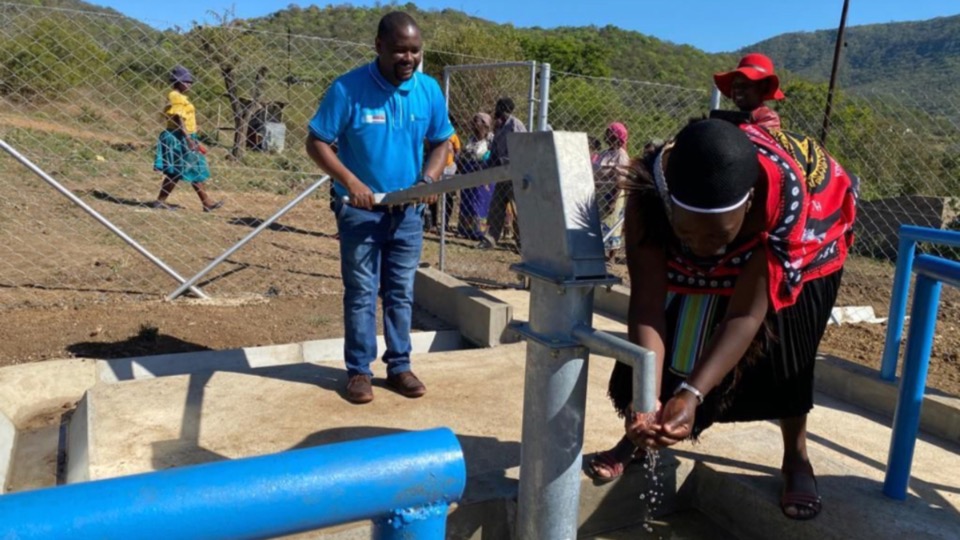By Mary Richards, Church News
Eswatini — a small country formerly known as Swaziland, bordering South Africa — faces urgent water issues. Recent studies found that 40% of rural communities in Eswatini lack access to clean and safe water, and 25% of the infrastructure that does exist — like taps and toilets — is not functional.
To combat the water crisis, community leaders are working with The Church of Jesus Christ of Latter-day Saints and WaterAid — a nonprofit organization that has focused on water, sanitation and hygiene projects for more than 40 years.
The Church and WaterAid not only provided 10 updated boreholes or wells in local communities in 2022, they also empowered the residents to take ownership of the water systems and keep them maintained and operating.

11-Eswatini.jpeg
Gcinile Dlamini, 17, left, and Ncobile Vilakati, 18, right, use a hand-wash station provided by WaterAid at Mpolonjeni High School in Mpolonjeni in the Lubombo province of Eswatini. WaterAid, with funding from The Church of Jesus Christ of Latter-day Saints, provided new pumps, wells or boreholes in Eswatini in 2022. Photo by WaterAid, courtesy of Church News.2023 by Intellectual Reserve, Inc. All rights reserved.Building New Wells in Eswatini
Phesheya Nxumalo, WaterAid’s program officer in Eswatini, said funding from the Church allowed for the construction or improvement of hand pumps and wells in several communities, with a goal to reach nearly 5,500 people.
At a handover event in July, community leaders and members joined to celebrate the improved technology — which immediately improved access to sustainable water, sanitation and hygiene.
“At WaterAid, we install water and sanitation systems that are locally owned, repaired and maintained,” Nxumalo said. “That means that clean water for drinking, cooking and cleaning is closer to homes, schools and healthcare centers, reducing the need to walk long distances for water.”
Children can then spend more time learning in school, and mothers, newborns and frontline health workers are at a lower risk of infection and disease.
“The older people of our community and people with disabilities who couldn’t walk as far to collect water have easy access to clean water like everyone else,” he said.
The pumps also provide additional water for irrigation and promote commercial farming among the communities, leading to better preparedness and quality of life among residents.
Promoting Ownership and Resiliency
Safe drinking water is a priority for the Church, through partnerships with nonprofit organizations and missionary humanitarian work taking place around the world.
Mxumalo said WaterAid does more than build taps and toilets — they promote community responsibility in order to create lasting change.
“It’s important to involve local residents and have systems in place that ensure that if things go wrong, they get resolved,” he said. “When a water pump breaks, you need locally available parts, mechanics and funding to fix it. This is how everyone will benefit from water, sanitation and hygiene facilities for years to come.”

2-Eswatini2.jpeg
Water committee chairwoman Make Thubelihle Gadlela washes her hands at the new handpump in the Lubombo region of Eswatini. WaterAid, with funding from The Church of Jesus Christ of Latter-day Saints, installed 10 new wells or hand pumps in Eswatini in 2022. Photo by WaterAid, courtesy of Church News.© 2023 by Intellectual Reserve, Inc. All rights reserved.The team designed programs in Eswatini that improve sustainability through workshops and skills training. That way the people were empowered to take ownership of the clean water systems in their communities.
WaterAid collaborated with local leaders and officials to keep it all running. In this case, a local water management committee was established for each well and water pump.
Make Thubelihle Gadlela is the chairwoman of the local water committee in the Lubombo region.
“The most threatening thing to everyone’s life in this area is the water crisis,” said Gadlela. “All water sources were far, and none of them had clean water. Our children were really struggling to perform well academically because they had to attend classes exhausted after walking long distances to fetch water.”
Gadlela — and the other committees in each community — plan to ensure that the wells are maintained properly and operating for generations.
“We are grateful for the generous support, and we will sustain and maintain the borehole,” she said.
Copyright 2023 Deseret News Publishing Company.